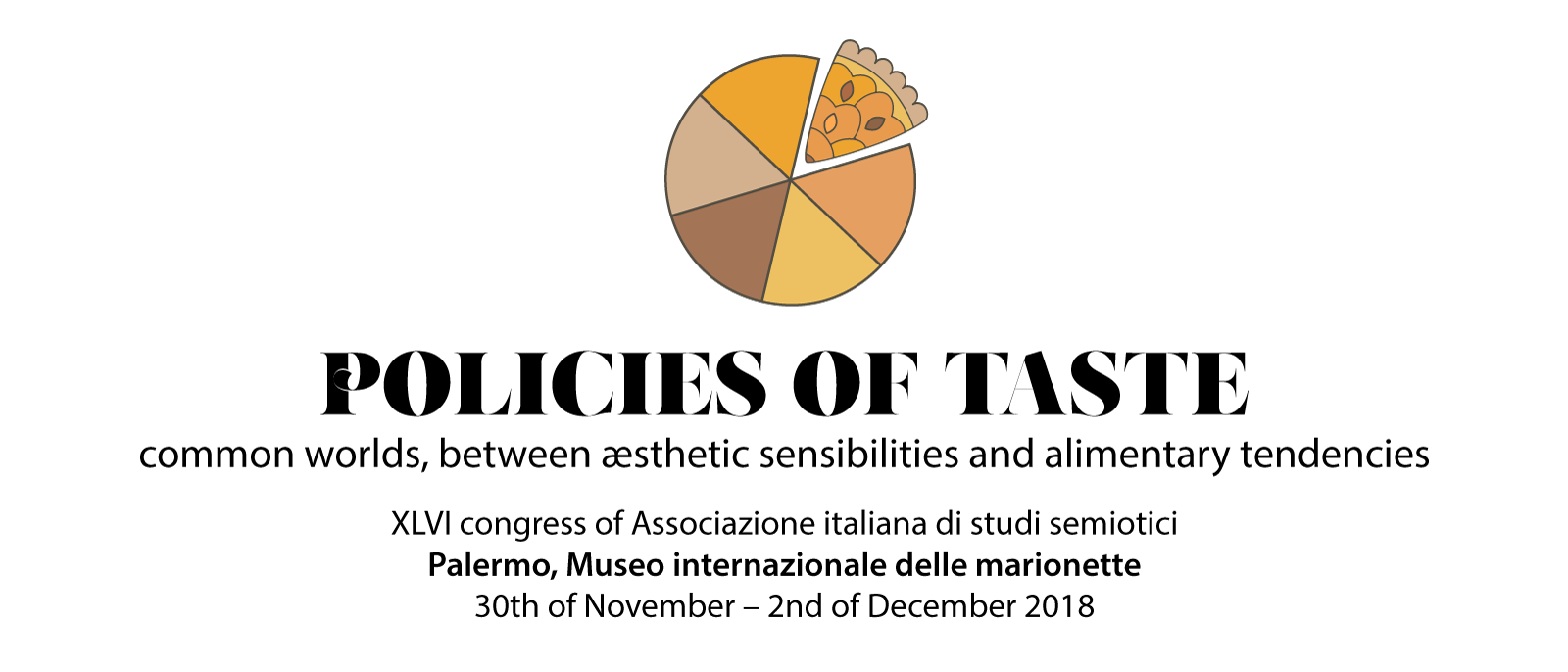
Versione italiana - Version française
In collaboration with
- Prin 2015 “Cucina politica” (Università di Bologna, Palermo, Pollenzo)
- Università degli studi di Palermo, Dipartimento Culture e società
- Circolo semiologico siciliano
- Fondazione Ignazio Buttitta
- Associazione per la conservazione delle tradizioni popolari
- Centro internazionale di scienze semiotiche
- Dottorato in scienze del patromonio culturale – Università degli Studi di Palermo
Politics and taste, today, seem to have divergent destinies. In fact, they almost look antithetic. The former seems the reign of a power which is more and more interested in itself than in the public sphere, with a very small capacity of catching the infinite nuances that nevertheless pervade the world and social culture. The latter seems to be closed in the impermeable realms of art, on one side, and of cooking, on the other side, hence verging towards rigid and precocious forms of institutionalization.
However, in the media culture, on the web and outside of it, these two discourse universes intertwine and blend, without ever completely overlapping, and together with, or next to the policies of nature, cure, entertainment, we are immersed in the policies of taste. Politics, especially when it is considered as something plural, looks for some distinction or judging criterion, as it is the one which is traditionally given by taste. And if it is seen in its multiple meanings, this criterion seems to need a subtler articulation of sense, plural signifieds that derive from worlds that hopefully meet.
Semiotics has always considered taste as a relevant research topic. Nevertheless, the reflection of semioticians has gone beyond the traditional problems of aesthetic judgement, focussing the analysis on phenomenology and on the role of sensibility in the constitution process of meaning. Thus, the theme of beauty is reappraised while what becomes preeminent is the general ability of understanding forms and the kind of involvement of the perceptual subject. Moreover, this approach lets clearly emerge the social character of taste and it shows how sensible appreciation responds to cultural dynamics that over-determine the individual judgments. Then it permits to explain why the phenomena of collective appreciation towards certain formal types can be transversal to an entire era or to specific cultural moments. By this perspective, the domain of taste and its policies can be extended from the restricted sphere of fine arts and natural beauty to all the sensible manifestations of “a culture”. These latter will appear less or more appreciable as they conform more or less to shared taste models. The world of cooking, the table and commensality here come into play with all its force and urgency.
This way, the judgment of taste ends up with contributing to the determination, to a certain extent, of all the axiologies of a culture in all its fields: from food to the arts and science, to the ways of worship, or to how we conduct the relationships with the Other.
Thus, here again politics emerges, as art and technique of thinking and organizing common worlds, according to taste, and for the taste. For instance, it is possible to think about the current debates around the value of non-human animals, which from work tools or raw material for human nutrition have become people of the house, social actors to be protected polemically, or heavily cuddled. What about their taste, after they have been introduced in our common world? It happened at the expense of who or what?
This meeting of semiotic studies around the politics of taste – both present-day and not – intends to discuss that all, testing the categories and models of the current science of signification, and dialoguing both with other fields of knowledge and approaches (as, for example, aesthetics, sociology of consumption, political theory and historiography, anthropology and food studies, theory of arts and agri-food disciplines), and with some actors – politicians, cooks, artists, art critics and restaurant journalists – who work directly in their respective sectors.
Some of the topics that may be explored are:
- In the aesthetic and artistic field:
- Policies about education to taste
- Destinies of Kitsch
- Artistic practices and artworld: “artification” and “dis-artification”
- Policies about vintage: flavour, memory, feel
- Bad taste and good feelings
- In the political and cultural field:
- Policies about nature and food
- Policies about agro-alimentary production and distribution
- Alimentary regimes and political ones
- Policies about wine and food consumption and the artistic one
- Alimentation and the forms of sacrum
- Gastromania and post-gastromania: myths, rituals, practices
- Diets and meaning regimes
- Processes of construction/invention/destruction of historical-anthropological identities through cooking practices (typicalities, traditions, etc.)
- In the communication domain about food:
- Mediatization of food and arts (press, photography, cinema, tv, new media)
- Gastronomical discourse and the aesthetic one
- Alimentary regimes and political ones
- Culinary, convivial and artistic narrations
- Places and tendencies of cooking
- Objects, technologies, design that have to do with the kitchen
- Arts and food
- Waste and junk
- Food branding and communication forms
- Forms of artistic and gastronomic criticism
- Aesthetics of laying and of the kitchen
- Forms of eno-gastronomic, artistic and museum tourism
- Dialogues and inter-ethnic conflicts in cooking and around the table
- Epistemology: policies and ethics about wine
The deadline to send proposals at the email of AISS (info@associazionesemiotica.it) is the 30th of August 2018.
The acceptance of proposals will be communicated within the 15th of September 2018.
Proposals must be 1500 to 3000 characters long + bibliography + brief bio note.
The scientific committee responsible for the proposals selection is composed by the AISS Direction and by the local head of PRIN 2015 Gianfranco Marrone (Università di Palermo)
All the logistic and organizational info about the Congress will be published on the following websites:
http://www.associazionesemiotica.it/ https://www.circolosemiologicosiciliano.it
